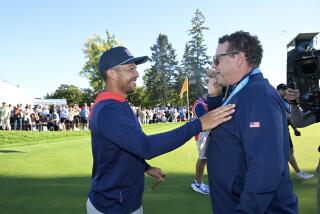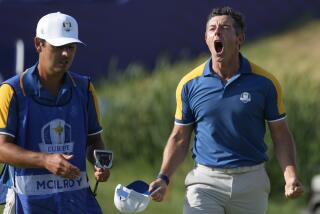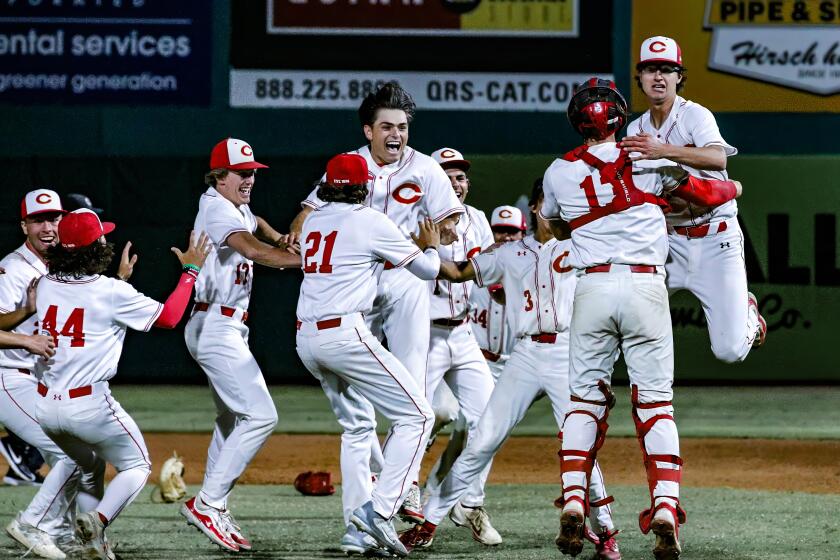British Chances Seen as Good in Ryder Cup
- Share via
SUTTON COLDFIELD, England — It was at Walton Heath in 1981, the last time the biennial Ryder Cup Matches were played in England, that the distressed British captain, John Jacobs, murmured:
“I wonder if we shall ever win again.”
His team had just been administered an 18 1/2-to-9 1/2 thumping by what may have been America’s strongest team ever.
It included Jack Nicklaus, Tom Watson, Lee Trevino, Ray Floyd, Hale Irwin and the man U.S. captain Dave Marr called “my baby-faced killer,” Larry Nelson.
Only one of those six stars is a playing member of the U.S. team that departs today to engage the British-European forces in the most important of all international golf team competition. The matches will be held Friday through Sunday at The Belfry Golf Club, home course for the British PGA.
And it very well could be the year Jacobs was dreaming about, wondering if it would ever come.
It could be the year that the British, now bolstered by the stars from the European Continent, could, at last, win another Ryder Cup match.
It has been a long dry spell.
In the years immediately following 1927, when Samuel Ryder, a wealthy British seed merchant, put up a silver cup for biennial competition between professionals from Britain and the United States, play was close, with the first four matches being split.
But since World War II, the British have won but once and tied once. Since 1959, they haven’t won at all.
But the British-Europeans expect to be the favorites this time.
Their 12-man team is led by Seve Ballesteros of Spain and Masters champion Bernhard Langer of West Germany, arguably the two best players in the world today.
And it is supported by other stars such as British Open champion Sandy Lyle of Scotland, Nick Faldo of England, British PGA champion Paul Way and Spanish veterans Manuel Pinero and Jose-Maria Canizares.
The American side, on the other hand, is missing longtime Ryder Cup stalwarts such as Nicklaus, Watson, Irwin and Nelson, a key figure in the last few American victories. Trevino is the non-playing captain, and, at least on the surface, he’s optimistic.
While he is quick to point out the British-Europeans “get better every time we meet,” he also pointed to a new, shorter qualifying period for the American team selection.
“It used to be spread over a full year. Now it’s just eight months. That means you’re more likely to get the players on the team who are playing the best right now,” he said.
But it hasn’t worked out that way. Excluding U.S. Open champion Andy North and PGA titleholder Hubert Green--each of whom broke a long slump with the victories that put them on the Ryder Cup team--only two players on the U.S. side have won in the last four months.
Two of them, Peter Jacobsen and Craig Stadler, have not won at all this year.
Aside from Green and North, neither of whom would have made the team but for their major-title victories which mean automatic selection, the latest winner on the U.S. team is Curtis Strange. He scored his third victory of the season in the Canadian Open. But he’s missed the cut in two of his last three starts.
The only other winner on the U.S. team since May 5 is Hal Sutton.
The other members of the U.S. team are the veteran Floyd, Lanny Wadkins, Calvin Peete, Mark O’Meara, Tom Kite and Fuzzy Zoeller.
Despite the potential problems, Trevino insisted, “We know what we have to do and we’re ready to do it.”
The first two days play will be given over to four-ball and Scotch foursomes, with eight matches daily. On Sunday, 12 single matches are scheduled, with one point awarded in each match.
More to Read
Go beyond the scoreboard
Get the latest on L.A.'s teams in the daily Sports Report newsletter.
You may occasionally receive promotional content from the Los Angeles Times.










